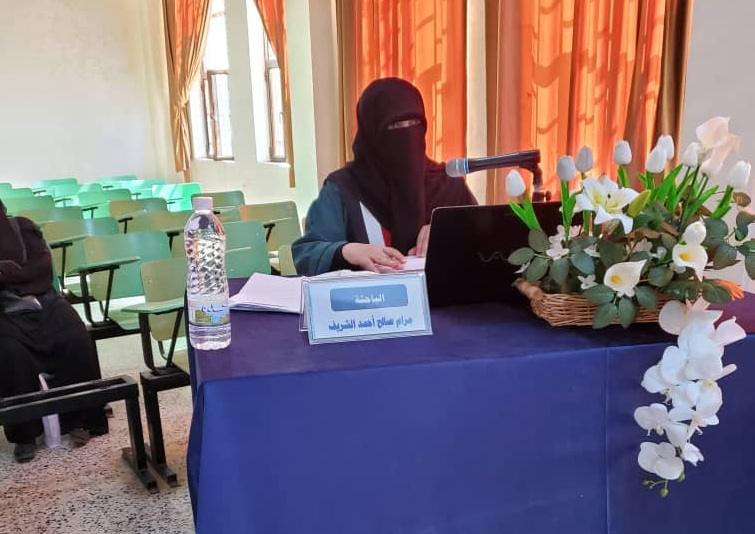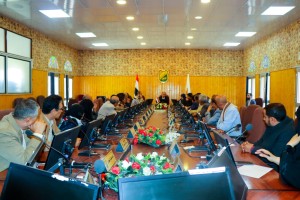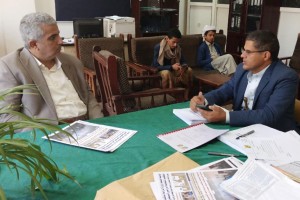Public PhD Viva-Voce Examination of Ms. Maram Saleh Ahmed Al-Shareef
- Categories Letters and Promotions - Graduate Studies, news, Regulations - Postgraduate Studies
- Date January 16, 2025

The Public Viva-Voce Examination for the PhD Dissertation hereto entitled, Translation Quality Assessment of Arabic Subtitles of the American TV Series Lost in the Light of Pedersen’s Model, submitted by Ms. Maram Saleh Ahmed Al-Shareef, Department of Department of English , Faculty of Faculty of Languages , was held on Thursday, 9/7/1446 Hijricorresponding to 9/1/2025. The Viva-Voce Committee, which was formed based on a resolution issued by the Post-Graduate Studies and Scientific Research Council, consisted of the following:
Committee Members Designation University Position
1 Prof. Mohammed Qasim Shormani External Examiner Ibb University Chair
2 Assoc. Prof. Abdulhameed AbdulwahedAshuja’a Main supervisor Sana’a University Member
3 Assoc. Prof. Mujeeb Ali Murshed Qasim Internal examiner Sana’a University Member
The study aimed to
1. Apply Pedersen’s (2017) FAR model to analyze the quality of the Arabic subtitled translations in the TV series Lost.
2. Identify the subtitling strategies used in translating nicknames in the TV series Lost into Arabic.
3. Identify types of nicknames found in the TV show Lost and the purposes they serve in the show.
4. Analyze the factors that contribute to the accuracy or inaccuracy of the Arabic subtitles.
The study concluded with a number of findings, including
1. The quality of the Arabic subtitles was low at the semantic level. These shortcomings stemmed from practices such as literal translation, retention of meaningful nicknames, omission of crucial plot-related expressions, and semantic deviation from the original.
2. Acceptability errors that made subtitles sound unnatural seemed to occur as a result of the structural interference of the source text. Replicating the sourcetext structure and elements, led to unnatural phrasing in the target language.
3. Lack of proficiency in using the subtitling software was the reason of punctuation errors that stemmed from incorrect utilization of subtitling software.
4. The findings revealed that the nicknames in the show were not used arbitrarily but for a purpose. They were employed to highlight characters’ positive or negative attitudes, convey emotions such as familiarity, affection, or animosity, and add humor to the scenes, while also disclosing important details about the characters’ backgrounds and origins
5. The lack of knowledge of the show seems to be a contributing factor that negatively affects the quality of the subtitles, leading to various errors. When subtitlers lack knowledge about the show they are working on, they are more likely to make mistakes in translating dialogue, capturing emotions, or conveying important plot points accurately leading to errors that compromise the quality of the subtitles.
6. Following the established subtitling guidelines seems to be a crucial factor in improving the subtitling quality as the deviation from the subtitling guidelines caused various errors. Subtitling guidelines provide standards for formatting, timing, character limits, line breaks, and other technical aspects of subtitles. Consistent adherence to these guidelines improves the quality of the subtitles.
The researcher made several recommendations, including
1- To improve the quality of Arabic subtitles, subtitlers should avoid literal translation for expressions with implicit meanings, retain meaningful nicknames, omit crucial dialogues, and refrain from deviating from the original content’s meaning. This could enhance subtitle quality, making content more understandable for viewers.
2- Subtitlers need to have technical skills to avoid technical errors and enhance the quality of subtitled translations.
3- Subtitlers should consider understanding the purpose behind the use of nicknames in dialogue and prioritize conveying the speaker’s intended meaning accurately as it has the priority to be preserved in subtitling.
4- It is crucial for subtitlers to watch the entire program they are translating to prevent errors stemming from a lack of familiarity with the content. This practice could ensure high-quality subtitles and enhance the overall viewer experience.
5- Subtitlers must possess research skills to prevent errors caused by inadequate research for accurate meanings. Research skills should be gained to ensure high quality translation.
6- Subtitlers should follow the established subtitling guidelines to improve the subtitling quality as the deviation from these subtitling guidelines causes various errors that affect the quality of the subtitles.
7- Subtitling practitioners should adopt subtitling quality assessment models and processes. This approach not only helps in error identification but also provides valuable feedback for understanding and avoiding future errors.
ThePhD dissertationhas been examined and is recommended by the Viva-Voce Committee for acceptance and approval. The Candidate was recommended to be awarded the degree ofPhD majoring inTranslation.
The viva was attended by academics, researchers, students, and other interested individuals, including the researcher’s colleagues and family members.
Discover more from Sana'a University
Subscribe to get the latest posts sent to your email.







